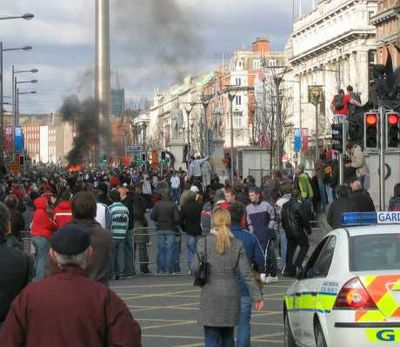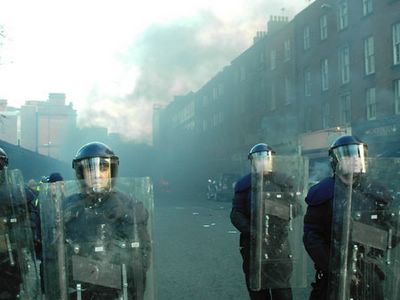
Crowds gather in O'Connell Street.
Last Saturday afternoon, February 25, a confrontation between two groups of demonstrators led to a small riot in central Dublin. A group of Northern Unionists under the name 'Love Ulster' had bussed down to Dublin with bands and Union Jacks with the intent of marching down O'Connell Street, Dublin's main thoroughfare. Had the march proceeded, they would have passed by the General Post Office where the Easter Rebellion against British rule in Ireland had been proclaimed in 1916. The professed aim of this group was to commemorate the Unionists who had died at the hands of the IRA during the Northern Troubles of 1969-97. Some Irish commentators dryly likened such naivety to a group of Taleban or Al Quaeda supporters proposing a march down New York's Fifth Avenue. Nevertheless, the government and all the political parties (including Sinn Fein) shrugged their shoulders, and advised the populace to ignore these people and just let them get on with it.
Unfortunately, an organized band of 200-300 hardline republicans thought differently and when they moved in to block the Unionist parade they came in direct conflict with the Gardai (Irish police).

Smoke bombs, stones, and building materials were thrown by the protestors.
Construction is going on in O'Connell Street so a lot of useful material lay at hand for the demonstrators to throw at the police.The clashes were sporadic with several dozen injuries, many to the police, but hardly more than a skirmish compared to the riot of 1981 when tensions in the North were running very high.
The police pushed the demonstrators south of the river and several cars were overturned and torched in Nassau Street before the rioters and their hangers-on (mainly inner-city youth in hoodies with scarves pulled over their faces) decided to call it a day and go home to their tea. The cars targeted were Mercs and BMWs which says a lot more about economic disparities than the national question.
In 1981, during the IRA Hunger Strike, there was a serious riot in which thousands took part and which led to the burning down of the British Embassy. Saturday's events were minor by comparison, but the return of violence to the streets of Dublin came as a very unwelcome wake-up call to the country's leaders and the complacent majority of the population who had hoped and believed that the passions aroused by the continuing partition of the island had largely subsided since the 1998 Good Friday Agreement.

Gardai in Nassau Street.
Today's editorial in the Irish Independent can be read here.